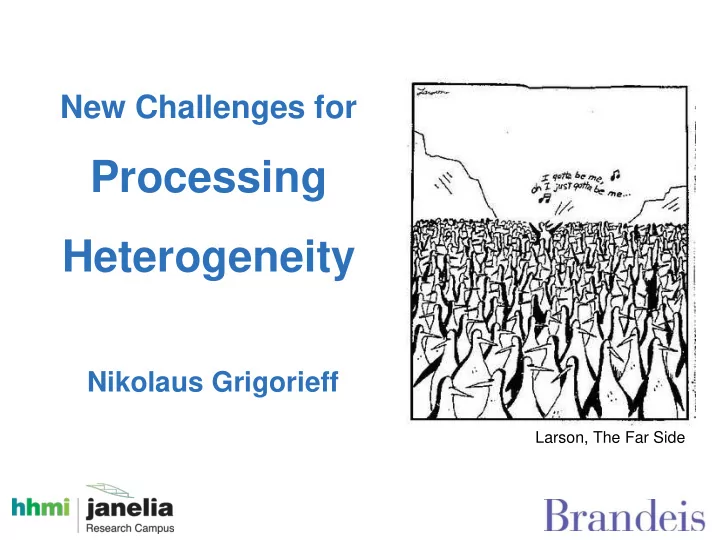

New Challenges for Processing Heterogeneity Nikolaus Grigorieff Larson, The Far Side
Heterogeneity and Biology Translocation, Brilot et al 2013 Glutamate receptor, Dürr et al 2014 GroEL/GroES ATP cycle Kinesin power stroke Clare et al 2012 Sindelar & Downing 2010 Spliceosome, Wahl et al 2009
Types of Heterogeneity Compositional Conformational discrete continuous General
Classification Goal Group images based on their similarity.
Noisy Data Group images based on their similarity so that averaging enhances common features (signal) and reduces noise .
Common Strategies Supervised classification K-means Hierarchical ascendant classification (MRA) (MRA/multiparticle, ML2D/3D, ISAC)
Classification Procedure Align MSA Classification MRA
ML Classification Seeds Maximization Expectation 𝐪 (z i =k| Θ ,X ,X)
The Advantage of ML Count - 0 Correlation difference
Some Results Larson, The Far Side
The Beautiful Ribosome 250 Å pre pre pre 27% 3.5% 2.4% 70S ribosome + EF-G tRNA Dataset: EF-G 1.3 million particles 300 kV, Falcon I post post 100 Å 13% 6.8% Brilot et al. 2013
A Dog’s Breakfast 50 nm Spliceosome Anna Loveland, unpublished
Classification and RCT/OTR Negative stain data E3 ubiquitin ligase Ltn1 180 kDa Dataset: 68k particles, 12k final ML2D, MRA, MSA, HAC Random conical tilt reconstructions 200 Å Lyumkis et al. 2013
Cleaning up Datasets Frealign refinement & classification 43% 49% EMAN2 initial model K-means classification 32% 25% 50 Å 82278 particles 3.9 Å resolution VSV polymerase 250 kDa 356211 particles 25% 26% F20, K2 Bo Liang, Zongli Li, Simon Jenni, Tim Grant Steve Harrison, Sean Whelan, Tom Walz
Problems & Limitations Larson, The Far Side
Potential Pitfalls of K-Means • Circular cluster shapes only • Results sometimes strongly dependent on initial seeds • May not converge to global optimum • Incomplete separation of classes
Incomplete Separation 6.4% 2.4% 3.3% 70S ribosome + EF-G Brilot et al. 2013
Detecting Heterogeneity 40S ribosomal subunit bound to CSFV-IRES, DHX29 and eIF3 • Computationally expensive Very sensitive to particle • misalignments 26317 particles (one class out of 630k particles) 40k bootstrap volumes Hashem et al. 2013
(Ir)reproducibility TRPV1 channel Dataset: 88915 particles Relion Frealign (300 kV, K2) Refinement & classification Refinement & classification 35645 particles (40%) 38326 particles (44%) Overlap: 23230 particles (~60%) Liao et al. 2013
Interesting Questions • What is wrong with the ~60% of particles that did not produce good reconstructions? • Why is the overlap of classes not better?
Resolution Adding or subtracting • 1 particles to the Frealign class slightly degrade resolution. 0.8 Possible interpretation: • 0.6 FSC Additional particles from • 0.4 Frealign class Sum Relion class were Intersection 0.2 misaligned by Frealign (and vice versa). 0 • Classification can 0 0.05 0.1 0.15 0.2 0.25 0.3 0.35 separate aligned form Resolution [Å -1 ] misaligned particles. Frealign class (38326 particles) Sum of Frealign and Relion classes (50755 particles) Intersection of Frealign and Relion classes (23216 particles)
Continuous Heterogeneity Larson, The Far Side
Normal Modes 70S ribosome + EF-G 70S ribosome (non-rotated) 70S ribosome + EF-G (rotated) Normal mode corresponding to ratcheting Reconstruction from bins with * from bins with * Jin et al. 2014
Deformable Particles c 0 0 a Clathrin cage Q 0 0 a bound to auxilin and Hsc70 0 0 c a Model FSC at 22 Å (σ = 0.016) 0.157 a c const. surface 0.145 a c const. volume No 0.107 deformation 0.108 5 a c Fotin et al. 2004, Xing et al. 2010
Alignment With Masks 80S ribosome + Sec61 60S ribosome + Sec61 Voorhees et al. 2014
Flexible Helical Filaments Phage tubulin (PhuZ) 20 nm Frealix Software for helical processing CTF estimation (ctffind4) Motion correction (unblur) Frame selection Subframe motion (Frealix) 3.6 Å resolution Elena Zehr, Alexis Rohou, David Agard
Full Filament Approach Cryo-EM 3D filament tracking Structure refinement 3nm Frealix Software for helical processing Improved mechanical model Deformation statistics Rohou & Grigorieff 2014
Amyloid Fibrils 450 total, Frealix, 7.5 Å 188 straightest, Frealix, 7.1 Å A β (1-40) 188 most curved, Frealix, 8.3 Å 188 most curved, Frealign, 8.9 Å Rohou & Grigorieff 2014
Summary and Questions How do we detect heterogeneity? • Search for weak/blurred density, calculate variance maps. – How do we make sure it does not lead us to the incorrect result? • Carful biochemistry, repeat analysis with many different starting conditions, – check that the results make structural/biological sense. How to distinguish conformational vs. compositional variability? • Biochemistry, classification, modeling, possibly 3D MSA of bootstrap volumes – (Klaholz/Penczek). What are the prospects for getting to atomic resolution for a small • and heterogeneous particle? Guess: 200 kDa particle with 20-50 kDa heterogeneity should be possible. – Are there some samples that will never be amenable to high • resolution reconstruction? Very likely, for example if a particle contains large unstructured domains. – Bottom line Better biochemistry , bigger datasets , bigger computers , better algorithms
Acknowledgements EF-G ribosome Axel Brilot, Andrei A. Korostelev, • Dmitri N. Ermolenko Spliceosome Anna Loveland, Melissa Moore • VSV polymerase Bo Liang, Zongli Li, Simon Jenni, Tim Grant, • Steve Harrison, Sean Whelan, Tom Walz Phage tubulin Elena Zehr, Alexis Rohou, • David Agard, Joe Pogliano Frealix Alexis Rohou • Cryo-EM facility Chen Xu (Brandeis), Zhiheng Yu (Janelia) • Financial Support: HHMI, NIH •
Thank You!
Recommend
More recommend